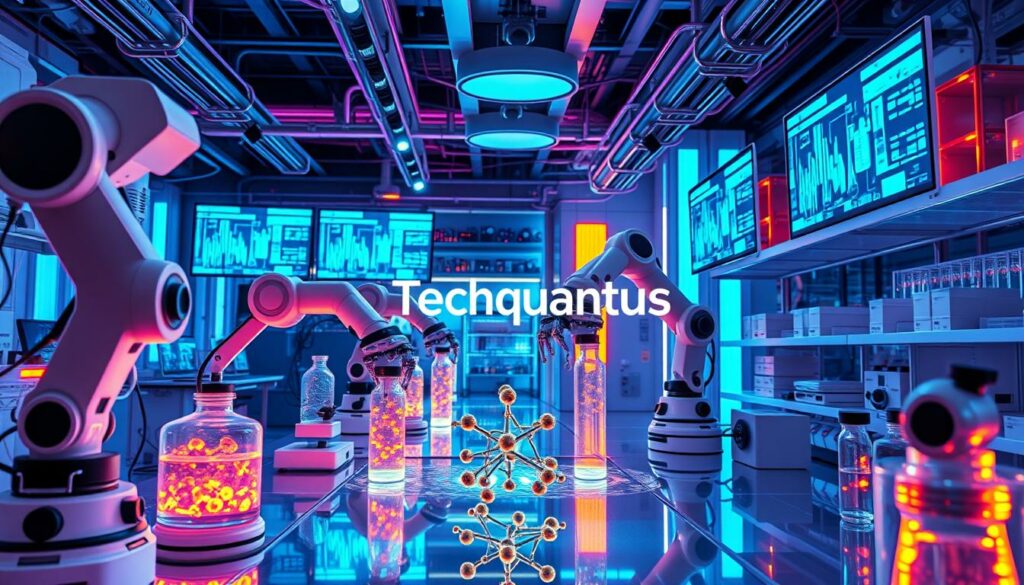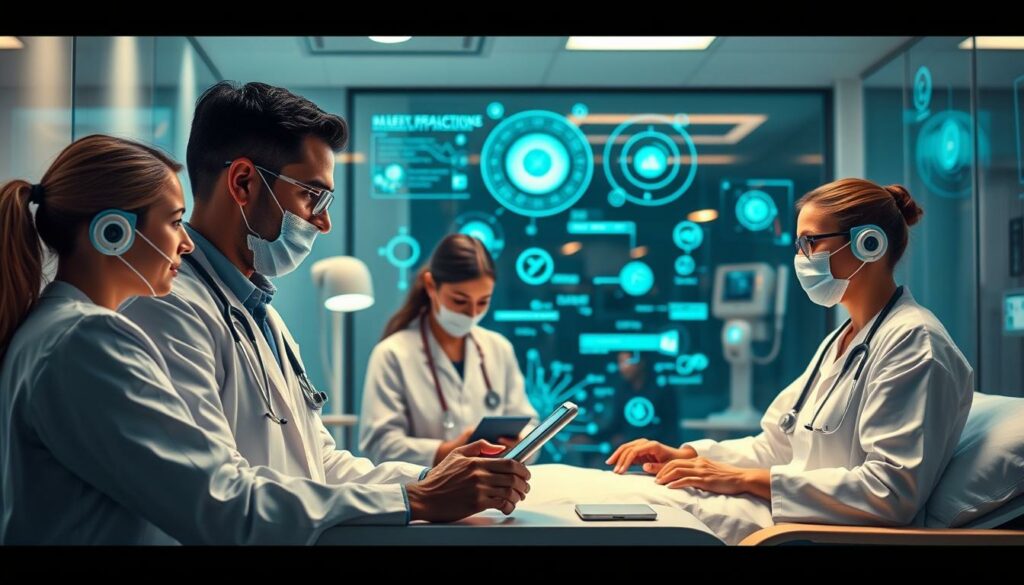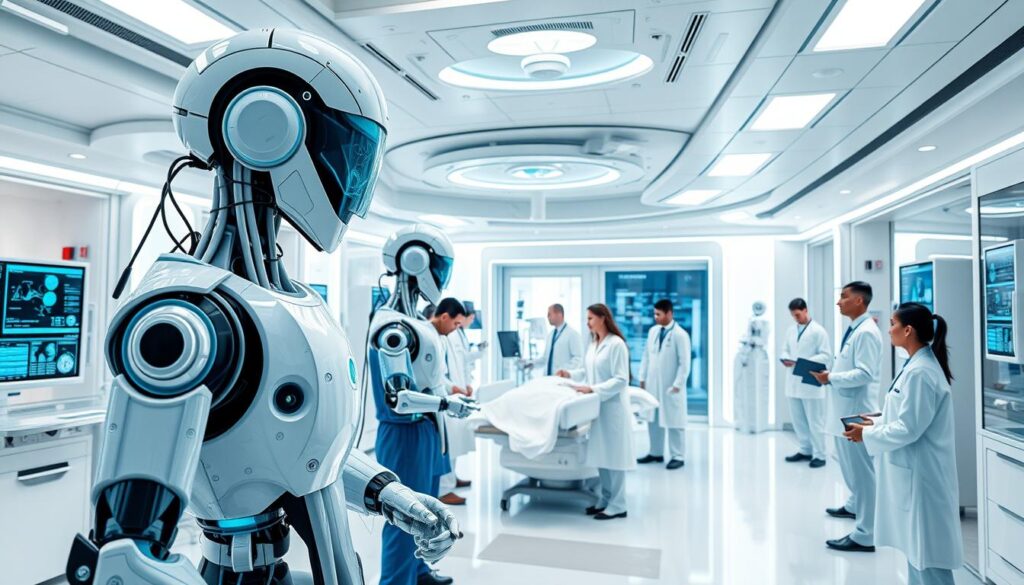Did you know that heart diseases are the top cause of death worldwide? A study by the US National Institutes of Health (NIH) tracked 27,939 women for 30 years. It found that those with high blood biomarkers were 70% more likely to get heart disease. This shows we need new solutions for healthcare challenges.
The future of healthcare is bright, thanks to artificial intelligence (AI). AI technologies are changing how we diagnose and treat patients. We’ll look at how AI is changing healthcare and its big impact on patient care.
Key Takeaways
- AI is changing healthcare by making patient care better, making clinical processes smoother, and improving how we diagnose.
- Machine learning algorithms help analyze complex medical data, predict diseases, and create personalized treatment plans.
- AI tools help radiologists spot issues in medical images, leading to earlier diagnoses.
- AI is key in finding new drugs by looking at biochemical interactions quickly and accurately.
- Predictive analytics with AI helps healthcare providers know what patients need, cut down on hospital visits, and manage ongoing conditions.
Embracing AI-Powered Diagnostics
Healthcare has seen a big leap forward with AI-powered diagnostics. These AI systems are getting better at looking at medical images like X-rays and MRIs. They spot things that doctors might miss, helping catch diseases early and improve treatment.
Computer vision in healthcare makes checking medical images faster. This lets doctors spend more time on patient care. Machine learning for disease detection is changing how doctors find and treat diseases. It makes finding diseases faster, more reliable, and cheaper.
“AI systems can analyze medical images with a level of detail and accuracy that often surpasses human experts, leading to earlier detection and more personalized treatment plans.”
AI is changing healthcare big time. It gives doctors tools to make better decisions and help patients more. As AI gets better, we’ll see even more changes in healthcare.
AI in Healthcare: Enhancing Patient Care
AI is changing how we care for patients, making healthcare more personal and efficient. AI-powered virtual assistants help patients by giving them advice, answering questions, and even tracking their health. They make scheduling appointments easier and keep an eye on health conditions in real-time.
AI helps doctors make better decisions by analyzing lots of data. It finds patterns and suggests the best treatments. This means patients get the right care they need.
AI is also changing how we collect and use patient data. Devices and wearables track health signs and catch early warning signs. This lets doctors act fast, improving care quality.
As AI becomes more common in healthcare, patients will get care that’s more tailored to them. It will be more efficient and based on data. The future of healthcare looks bright thanks to AI.
| Key Statistics | Insights |
|---|---|
| The global Internet of Medical Things (IoMT) market was valued at $48.7 billion in 2022. The IoMT market is expected to reach $370.9 billion by 2032. By 2025, the estimated cost of cybercrimes will increase to USD 10.5 trillion. | The rapid growth of the IoMT market shows AI is becoming a big part of healthcare. The rising cost of cybercrimes highlights the need to protect AI healthcare systems and patient data. |
“AI-powered virtual assistants can provide patients with customized guidance, answer their questions, schedule appointments, and even monitor their health conditions in real-time.”
AI is not just changing the patient experience; it’s also making healthcare more efficient. As AI gets better, we’ll see more ways it helps patients and improves care quality.
Predictive Analytics and Preventive Care
Artificial intelligence (AI) is changing healthcare by using predictive analytics. It finds risk factors and patterns early, helping doctors take action before problems start. This leads to better preventive care.
AI looks at a lot of data to spot risks. It checks a patient’s health history, lifestyle, and more. This helps predict diseases like diabetes or heart disease early. Doctors can then help patients change their habits or start treatments early, improving health outcomes.
Empowering Proactive Healthcare Interventions
AI for preventive care is real and happening in healthcare. For instance, AI looks at a patient’s genes, health records, and lifestyle to see disease risks. With this info, doctors can make preventive care plans just for that patient.
Using predictive analytics in healthcare, doctors can move from just treating problems to preventing them. This helps patients take charge of their health and makes healthcare better for everyone.
“The future of healthcare lies in the ability to anticipate and prevent, rather than simply react to, health issues. AI-driven predictive analytics is the key to unlocking this transformative shift in healthcare.”
AI-Driven Drug Discovery and Development
AI is changing more than just medical care. It’s also changing the way we make drugs. AI algorithms are making the process of finding new drugs faster and more efficient.
With AI-powered computational drug design, researchers can look through huge amounts of data quickly. This includes chemical compounds, genes, and biological data. It helps them find potential new drugs faster than before.
This not only makes finding new drugs quicker but also cheaper. It also increases the chances of making a successful drug.
AI can predict how drugs will work together and what side effects they might have. This makes the drug-making process safer and more effective. Because of this, the drug industry is using AI in drug discovery and AI-powered drug development more and more.
| Key Trends in AI-Driven Drug Discovery | Impact |
|---|---|
| Rapid growth of the drug discovery software market | Driven by the need to cut costs, reduce timelines, and improve transparency through deep learning tools |
| Transition to web/cloud-based solutions | Increasing demand for data sharing, scalability, integration, flexibility, and cost-effectiveness |
| Focus on AI/ML platforms for drug discovery | Big data combined with AI/ML helps generate data points in incomplete datasets, reducing the need for costly experiments |
| Growing demand for software solutions designed for biologics | 50% of drugs in the preclinical phase are biologics, indicating a shift in the industry |
The future of making drugs looks bright with computational drug design and AI for pharmaceutical R&D. We could see safer and more effective treatments for patients soon.

Natural Language Processing in Medicine
The use of natural language processing (NLP) is changing healthcare in big ways. NLP can find important information in unorganized medical data like notes and patient records. It helps doctors and researchers by making it easier to understand and use this data.
NLP is especially useful in making clinical documentation automation better. It can go through medical notes and reports, making them easier to understand and organize. This makes healthcare work more efficient and accurate.
Voice recognition is another area where NLP shines in medicine. It can turn conversations between doctors and patients into structured data, saving time. This lets doctors spend more time caring for patients and less time on paperwork.
NLP is also changing how we do medical research and find new knowledge. It can sift through lots of scientific papers to find new trends and insights. This helps researchers make faster progress and leads to better healthcare decisions.
The healthcare world is really starting to use AI, and NLP is a big part of that. It’s going to make a huge difference in how we care for patients and work in healthcare. By using AI to understand medical language, we can do more in healthcare and research.
“The integration of natural language processing in medicine has the potential to transform the way healthcare is delivered, enhancing patient care, streamlining workflows, and accelerating medical research and innovation.”
Intelligent Systems in Healthcare Administration
The healthcare industry is changing fast, thanks to AI. AI-powered systems are making healthcare administration better in many ways. They help with scheduling, managing resources, and keeping track of supplies. This leads to better healthcare services and saves money.
AI is changing how healthcare schedules patients and uses resources. It looks at lots of data to make schedules that cut down on wait times. This makes sure resources are used well and patients are happy.
AI is also key in managing supplies and improving supply chains in healthcare. It uses predictive analytics to predict what’s needed and automate buying. This keeps stock levels right, cuts down on waste, and saves money.
| AI Application | Benefit |
|---|---|
| Automated Scheduling | Improved resource allocation, reduced wait times, and enhanced patient satisfaction |
| Inventory Management | Optimal stock levels, reduced wastage, and cost savings |
| Supply Chain Optimization | Streamlined procurement, improved delivery times, and efficient operations |
AI helps healthcare organizations work better, save money, and focus on patient care. As AI use grows, we’ll see more new solutions. These will change how healthcare works and helps patients.
Machine Learning and Personalized Medicine
The mix of AI-powered personalized medicine and machine learning is changing healthcare. Advanced algorithms look at huge datasets to find what makes each patient unique. This helps doctors give treatments that fit each patient better, making care more precise and effective.
Machine learning for precision healthcare is making predictive models for individualized treatments possible. These AI systems check patient data like medical history and genes to guess the best treatment. This AI-driven patient stratification helps doctors make better choices, leading to better care for patients.
| Metric | Improvement |
|---|---|
| Tumor detection accuracy | 85% |
| Adverse reaction prediction | 92% |
| Treatment response rates | 78% |
Machine learning and personalized medicine are changing healthcare for the better. They offer care that’s more tailored, effective, and efficient. As this tech grows, AI-powered personalized medicine will shape the future of healthcare.
“The future of healthcare is personalized, and machine learning is the key to unlocking this potential.”
Ethical Considerations and Challenges
As AI grows in healthcare, we must tackle its ethical sides. We need to look at data privacy and security in AI-powered healthcare, bias and fairness in AI systems, and how AI makes decisions. These are big issues.
Healthcare groups must keep patient data safe and make sure AI is fair and open. The ethical implications of AI in healthcare mean keeping patient info private, stopping AI bias, and keeping trust in healthcare.
Also, we need regulatory frameworks for AI in medicine to make sure AI is used right. These rules should cover data handling, AI checks, and watching over AI in healthcare.
| Key Ethical Considerations | Regulatory Frameworks |
|---|---|
| Data privacy and security Algorithmic bias and fairness Transparency and accountability Patient autonomy and informed consent | EU’s AI Act Council of Europe’s Framework Convention on AI National AI regulatory efforts (e.g., Brazil, Canada, India, South Korea) International standards (ISO/IEC, CEN-CENELEC, ITU) |
By looking at these ethical issues and making strong rules, healthcare can use AI well. This way, we keep patients safe and build trust in society.
“The ethical use of AI in healthcare is not just a moral must, but key for keeping trust and driving lasting innovation.”

Conclusion
AI is changing healthcare in big ways, making how we give medical care and treat patients better. This article looked at how AI is making diagnostics smarter and medicine more tailored to each patient. It also talked about how AI is changing healthcare management and the ethical issues it brings.
As AI gets better, healthcare groups need to jump on these new chances. They must also tackle the problems to make sure AI is used right and works well. The future of healthcare looks bright with AI leading the way in making patients’ lives better and making healthcare work smoother.
AI’s future in healthcare is full of hope, promising to make medical services better, more accessible, and more efficient. We’re already seeing AI change medicine for the better, making new things possible in patient care. The path ahead for AI in healthcare is exciting but tricky. It needs careful handling to deal with the ethical and practical hurdles.
FAQ
What are the key applications of AI in healthcare diagnostics?
AI systems are getting better at looking at medical images like X-rays and MRIs. They can spot things that doctors might miss. This leads to catching diseases earlier and helping patients get better faster.
How is AI being integrated into patient care to enhance the healthcare experience?
AI-powered virtual assistants help patients by answering questions and setting up appointments. They also keep an eye on health conditions. AI helps doctors make better choices and find the right treatments for patients. Plus, AI devices track patient data to catch health issues early.
What is the role of predictive analytics and AI in preventive care?
Predictive analytics uses AI to spot risks and patterns that might lead to health problems. This lets doctors take action before issues start. It helps keep people healthy and lowers the risk of getting sick.
How is AI transforming the drug discovery and development process?
AI looks through huge amounts of data to find new drug possibilities faster than before. This makes finding new medicines cheaper and more likely to work. AI also predicts how drugs will interact with the body, helping make better medicines.
What is the impact of natural language processing (NLP) in medicine?
NLP helps understand unstructured medical data like patient notes and research papers. It makes processing and analyzing this data faster. This helps doctors, improves communication with patients, and helps in medical research.
How is AI revolutionizing healthcare administration and operations?
AI makes healthcare tasks like scheduling and managing supplies more efficient. It automates these tasks, saving time and money. This helps healthcare places run better and use resources wisely.
What is the role of machine learning and personalized medicine?
Machine learning finds unique traits in patients to tailor treatments. This approach leads to better treatments and fewer side effects. It’s a big step towards making medicine more personal and effective.
What are the ethical considerations and challenges surrounding the implementation of AI in healthcare?
There are big concerns about data privacy and AI fairness. Healthcare must protect patient data and make sure AI is fair and clear. Rules are needed to make sure AI is used right, keeping patients safe and ethical.
Source Links
- https://www.medicaldevice-network.com/news/study-identifies-blood-biomarkers-for-predicting-30-year-heart-risks/
- https://www.medicaldevice-network.com/news/edx-caris-molecular-profiling/
- https://medium.com/coinmonks/top-10-latest-trends-in-ai-development-for-2024-75ea5296a8f8
- https://finance.yahoo.com/news/single-board-computer-market-set-123000999.html
- https://www.knowcasino.co.nz/media/racing-drone-market-size-and-competitive-strategy-winning-in-a-saturated-market/887073/
- https://www.mdpi.com/1424-8220/24/17/5712
- https://www.nature.com/articles/s41467-024-51172-5
- https://www.einnews.com/pr_news/740123285/hospital-electronic-health-records-market-to-hit-usd-27-46-billion-by-2032-with-3-9-cagr-polaris-market-research
- https://www.news-medical.net/news/20240902/Different-types-and-sources-of-carbohydrate-found-to-be-protective-against-gout.aspx
- https://www.news-medical.net/news/20240902/Tirzepatide-outperforms-insulin-in-controlling-diabetes-and-promoting-weight-loss-in-clinical-trials.aspx
- https://www.mdpi.com/2077-0383/13/17/5200
- https://dailyinvestorhub.com/global-drug-discovery-software-market-was-valued-at-over-2-billion-in-2020-and-is-projected-to-increase-at-a-cagr-of-approximately-14-to-reach-3-5-billion-by-2025/
- https://www.openpr.com/news/3642134/artificial-intelligence-ai-chatbot-market-size-share
- https://www.mdpi.com/2079-9292/13/17/3481
- https://www.computerweekly.com/feature/Storage-technology-explained-Kubernetes-containers-and-persistent-storage
- https://www.fool.com/investing/2024/09/02/3-no-brainer-artificial-intelligence-ai-stocks-to/
- https://diginomica.com/monday-morning-moan-if-youre-transcribing-real-world-you-otter-not-be-using-ai-distorts-reality
- https://www.mdpi.com/2077-1444/15/9/1067
- https://www.mdpi.com/2072-6694/16/17/3060
- https://www.computerweekly.com/feature/Police-Digital-Service-staff-arrests-Everything-you-need-to-know
- https://iccwbo.org/global-insights/digital-economy/icc-overarching-narrative-on-artificial-intelligence/
- https://www.openpr.com/news/3642244/ai-in-respiratory-diseases-market-next-big-thing-major-giants
- https://www.mdpi.com/2673-1592/6/5/76
- Budgeting and Cost Control for IT Projects: My Expert Advice
- Learn How to Manage IT Projects Effectively with My Advice
- I Share My Best Data Backup Strategies Using Cloud Storage
- I Learned About AI Mistakes That Could Change Your Life
- Sustainable & Green Energy Solutions for Next‑Gen Data Centers Trend Report
Related posts:
 How Quantum Sensors are Changing the Face of Medicine
How Quantum Sensors are Changing the Face of Medicine
 How Generative AI is Changing Creative Industries: A Deep Dive
How Generative AI is Changing Creative Industries: A Deep Dive
 AI in Cybersecurity: The New Frontier in Protecting Data
AI in Cybersecurity: The New Frontier in Protecting Data
 Quantum Algorithms: A Deep Dive into Shor’s Algorithm
Quantum Algorithms: A Deep Dive into Shor’s Algorithm
 CISSP Domain 3: Security Architecture and Engineering
CISSP Domain 3: Security Architecture and Engineering
 How to Build Edge AI Solutions for Real-Time Data Analysis
How to Build Edge AI Solutions for Real-Time Data Analysis
